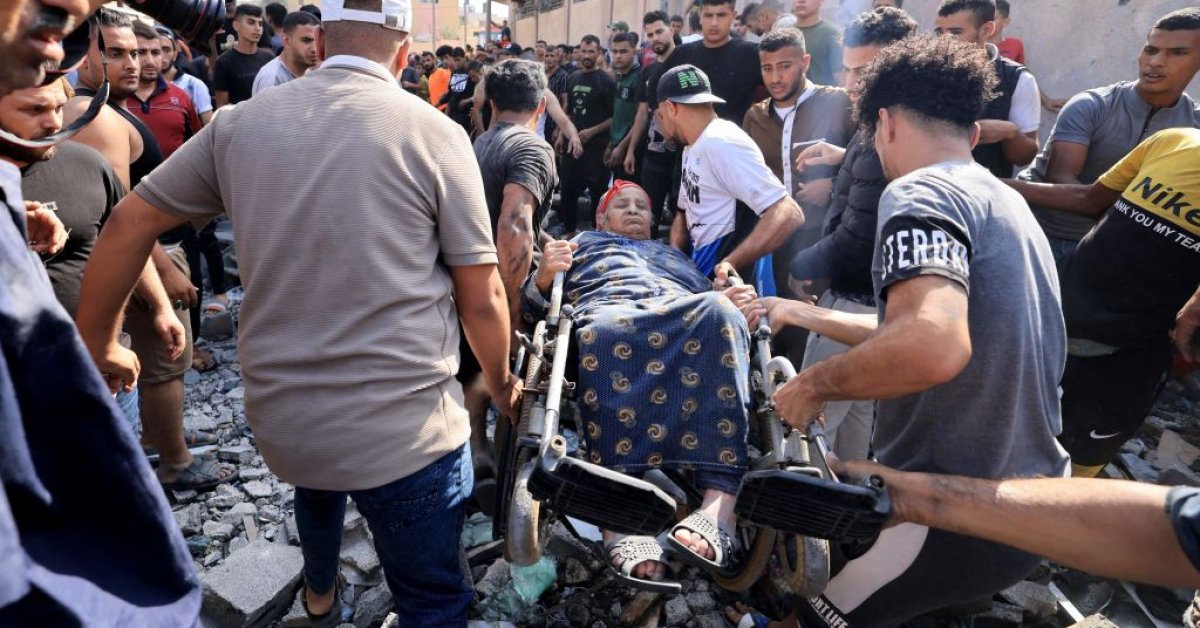International aid groups have warned that disabled people in Gaza are suffering disproportionately from the war between Israel and Hamas, with reports of two sisters who couldn’t hear the bombs and a 60-year-old woman who was left wrapped in a blanket in a shelter after her wheelchair broke during an evacuation.
On October 7, Hamas launched an unprecedented attack on Israel, killing 1,400 people and taking more than 200 hostage. Israel then launched bombing and ground operations in the Gaza Strip, killing more than 9,000 people, according to the Hamas-run Ministry of Health. Humanitarians have warned that the aid allowed in is not enough to meet the needs of the population. Before launching a ground invasion to combat Hamas, Israel ordered a mass evacuation from northern Gaza, but hospitals claim it would be impossible to comply.
The United Nations estimates that more than 15 percent of Gaza’s 1.4 million internally displaced people live with disabilities, as a lack of medical beds and supplies in shelters leads to ulcers and other ailments that cannot be treated in unsanitized environments.
Human Rights Watch released a report on November 1 collating interviews with 13 people with disabilities in the Gaza Strip who spoke candidly about the increased danger they face in the war between Israel and Hamas. Reported challenges include not being able to hear bombings or responding quickly to evacuation orders. TIME could not independently verify the accounts.
In a phone interview with TIME, Emina Čelimovic, a senior researcher at Human Rights Watch, argued that Israel and the UN have not complied with UN resolutions that protect the rights of disabled people and civilians with disabilities in conflict situations, and called on the US and other allies to take steps to protect disabled people and lift the blockade. “People have told me many times that they can’t stand this,” Čelimovic said.
In response to the report, the IDF issued an emailed statement on November 5, saying, “In response to Hamas’ brutality, the IDF is responding forcefully to dismantle Hamas’ military and administrative power. In stark contrast to Hamas’ deliberate attacks against Israeli men, women and children, the IDF is following international law and taking feasible preventative measures to mitigate civilian harm.”
The challenges facing people with disabilities in the Gaza Strip, a frequent battleground under Israel’s 16-year blockade, are a chronic issue that has drawn criticism from human rights groups.
Ziad Amro, a blind West Bank resident who is president of the Palestinian Association of the Blind and works for the nonprofit organization Educaid and the Independent Human Rights Commission, said he contacts disabled people in Gaza every day when he is able to.
“They have no access to basic necessities such as food, water, communications, internet and telephones,” Amuro said, noting that electric wheelchairs and devices to assist the visually impaired will not function without electricity, highlighting the lack of mobility and accessibility for many.
Reham Shaheen, a community rehabilitation specialist with the Gaza nonprofit Humanity & Inclusion who has remained in Jordan since the war began, separated from her husband and three children, told TIME that this population was struggling even before the war because the blockade made it difficult to meet their needs and policies were not inclusive enough to grant equal rights.
Shaheen said people have lost their homes, some separated from family, support systems and transportation. People with chronic illnesses who need medical care are unable to get it because hospitals are overwhelmed with seriously injured patients, and some don’t have the money to buy medical supplies like catheters from pharmacies, she added.
Iman and Abir, two sisters who are hard of hearing and who were only identified by their first names, told Human Rights Watch in a video recorded by a psychologist working at the school that has become a shelter that they feel isolated and powerless. “We don’t have hearing aids so we don’t know when the bombings are,” Iman said in a video posted to X. “We can feel the ground shaking and see people running away, not knowing what is happening.”
Some people told Human Rights Watch they struggled to escape the bombings quickly. Samif al-Masri, 50, who lost both legs in an Israeli drone strike in 2008, has taken refuge in Al-Quds Hospital in Gaza City, but feels helpless. “If they bomb the hospital, I will die,” he said in the report. “I know I cannot move.”
Shaheen’s colleagues in Gaza, who have been shifted to emergency response, recently reported that the family of a three-year-old with cerebral palsy had to evacuate their home, leaving behind assistive devices and medication, and the child suffered painful muscle spasms.
Asked about solutions, Shaheen said the top priority was a ceasefire, which is increasingly being called for by the international community. Israel has said it will not press for one until Hamas releases the hostages, and Western leaders have stopped short of calling for one, though U.S. President Joe Biden recently called for a “pause” to allow for humanitarian aid and hostage release.
Shaheen’s second priority is to ensure that more comprehensive aid reaches Gaza – with assistive devices and aid workers trained to work with people with disabilities. For Shaheen, it is crucial to collect data on Gaza’s vulnerable disabled people to ensure their needs are not overlooked in the future.

